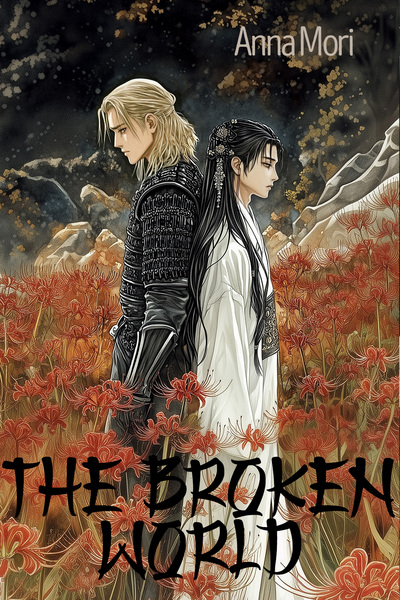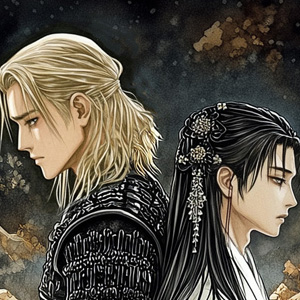As soon as Gerel returned to the capital from his journey to Namdo Fortress, the embassy dispatched by Tokhung to Emperor Yukinari set out on its way.
First, they sailed by ship to Nishiyama, the westernmost city of Ryukoku. The locals regarded them with suspicion but ultimately allowed them to disembark — evidently, they had been forewarned about the arrival of the Cheongju delegation.
From there, they had to continue overland.
"Why didn't we just sail straight to their capital? Isn't it on the sea?" asked a young guard, barely more than a boy.
"Shinju is on another sea," Gerel explained.
"There's another sea?" The boy was astonished.
Gerel felt a flicker of irritation. How could someone travel to a foreign land knowing so little about it — or, for that matter, about the world they lived in at all?
"Ever heard of a thing called a map?" he retorted sharply.
Ryukoku lay like a dragon's tail between two seas — on the west, it was bordered by the Inland Sea; on the east, by the Great Sea. The country's life revolved around these waters. Its narrow territory, mostly mountainous, offered little in the way of fertile plains or game-rich forests, apart from scattered islands.
This could pose a problem in war, Gerel mused absently, already calculating strategies in the event that their embassy returned empty-handed. Besieging mountain fortresses was difficult, but if the enemy army could be lured into open battle...
He wanted to learn as much as possible about this strange, foreign land. Before setting out for Shinju, he had begun studying the language of Ryukoku. Although he was accompanied by translators — and he and the emperor would understand each other regardless — there was no practical reason for him to learn it. But Gerel's curiosity was insatiable.
During the journey, he insisted that one of the translators converse with him exclusively in Ryukoku's language. He listened attentively to the lilting, singsong intonations, delighted whenever he could catch a word or form a response. He frequently recognized borrowed roots from Yuigui, though many words were pronounced strangely.
At first, it seemed the mountains were everywhere, rising steeply on either side of the imperial road. But as they traveled further east, the landscape began to change, growing more hospitable. Fields of rice, wheat, buckwheat, and beans appeared along the road, giving way to small villages. The closer they came to the capital, the larger and busier the settlements became. The road soon filled with an endless stream of merchant carts traveling in both directions, creating frequent bottlenecks.
At last, they reached the Great Sea. At the mouth of a river flowing into it lay Shinju — the Pearl, the capital of Ryukoku.
When the delegation's procession approached the main gates of the city, it was immediately surrounded by a crowd of onlookers. There was plenty to see: Gerel's retinue included over a hundred soldiers and courtiers, all clad in the unfamiliar, semi-military attire of Cheongju, carrying tall standards adorned with banners bearing the image of a white tiger on a black field — the flags of Cheongju.
Gerel had expected Shinju to resemble the Yuigui capital, as he knew it had been modeled after it. But while the two shared certain foundational elements — like the southern location of the main gate and the northern position of the imperial palace, in accordance with Taoist principles of spatial harmony — the similarities ended there.
Yuigui's capital, Baijing, was laid out as a perfect rectangle, its districts and streets forming orderly grids. Shinju, by contrast, lacked such precise geometry. Built on islands crisscrossed by rivers and canals, the city's layout was irregular yet elegant in its own way.
Though perhaps "elegant" wasn't the right word. For Gerel, other words came to mind: somber, impoverished, gray. Signs of decline were everywhere, remnants of the years of neglect during Emperor Yoshihito's reign — Yukinari's grandfather. Sculptures stood with their paint peeling, walls were worn and crumbling. Many buildings, once grand and opulent, now bore roofs and walls stained in shades of gray and brown. Originally, the colors must have been different, but the relentless wind and dampness had faded and darkened them, while patches of plaster had fallen away entirely.
Restoration was evident — walls were being repainted, repairs carried out. The emperor was undoubtedly spending vast sums to revitalize the city. But Gerel wondered whether this expenditure was wise. Wouldn't it be better to invest in strengthening the army or building fortresses? The sea and the wind were dismantling the city almost as quickly as it was being rebuilt. Who had thought to construct a city directly in the water in the first place?
The houses stood on stilts, the water lapping at their foundations, eroding them and leaving behind layers of mold, barnacles, and seaweed.
The region's climate was mild, with warm winters and cool, rainy summers. But the lack of greenery in the city made it seem unchanging, regardless of the season. There were no blossoms in spring, no snow in winter, no golden leaves in autumn — only canals and stone, dampness, and a heavy gray sky. A cold that seemed to seep straight into one's bones.
The city felt timeless, as though it existed outside the flow of seasons.
Shinju was undoubtedly beautiful — Gerel's companions gaped at its sights in awe. But it was a lifeless, alien kind of beauty. It felt as though the city existed in a world all its own, a world that had no room for the existence of people.
He had already seen three capitals in different countries, which gave him grounds for comparison. Pyeongwon, the capital of his own nation, was not something he liked to dwell on. It was crude and had never inspired any love in him. Designed originally for military purposes, it later became adorned with ostentatious trappings of wealth, like a newly rich provincial without pedigree. Yet none of this made it beautiful. The imperial palace in Cheongju was a fortified military stronghold and did not even pretend to be anything else. Emperor Tokhung had dug two moats around it and surrounded the residential quarters with towering walls — and no one would call him paranoid. (Although the floorboards, deliberately placed to creak under the steps of anyone entering a room, seemed to Gerel a touch excessive.)
At sixteen, he had seen Baijing, the capital of Yuigui, and it had, without exaggeration, left him awestruck. Where the buildings of Cheongju were heavy and monotonous in their gray uniformity, Baijing boasted blooming gardens, koi-filled ponds, intricately painted gates, dozens of temples, and roofs of cinnabar and azure that gleamed under the sun. Ornamental bridges wove throughout the city in a dazzling display of beauty. It was breathtaking — and entirely impractical. The imperial palace in Baijing bore no resemblance to Tokhung's fortress in Cheongju. There were no moats, no towering walls. Probably no creaking floorboards either.
The city reminded him of a home for paradise birds, a porcelain dream. Handle it carelessly, and it would shatter into colorful shards with a resounding crash. Gerel's first thought upon seeing Yuigui's capital had been, What will happen to this city when war comes here? His first impression of Yuigui's courtiers and nobility, glimpsed in palanquins and sedan chairs on the streets, had been no less vivid. These were the people shaping the fate of the most powerful nation in the world, yet they resembled the very paradise birds their city evoked — far removed from anything that could wield a sword. He could hardly imagine them even practicing archery; heaven forbid they might sweat.
Yet, after living in Baijing for some time, Gerel quickly realized how deceptive those impressions were. Politics, he learned, could be conducted without swords. The people in power in Yuigui were far from paradise birds. These elegantly dressed men and women, versed in poetry and philosophy, had somehow managed to raise their nation to the pinnacle of the world and keep it there. If not with swords, then with diplomacy — or more likely, with both. As far as he knew, despite their espoused values of peace and nonviolence, Yuigui made use of assassins as liberally as any other country.
And yet, given a choice, he would have been born in Yuigui. Not that anyone had asked him.
Now he was in the third capital of his life — Shinju, a cold, impoverished, unwelcoming city devoid of kindness.
It was the kind of place one might come to end their life — or lose their mind.
Their reception was grand and celebratory, but the celebration was a hollow one. Everyone adhered to flawless politeness, but their gazes betrayed no warmth. Which, of course, was to be expected. Everyone guessed that Gerel and his retinue had arrived with demands humiliating to Ryukoku, and a failed negotiation would mean war.
They were escorted to a guest pavilion — the Hall of Sunlight. Part of the palace complex, it stood slightly apart from the other buildings. Though richly decorated, it felt oddly empty and entirely unremarkable — likely the usual lodging for guests such as Gerel: not the most welcome ones.
Still, it served well enough as a place to rest after the long journey, to wash, and to change into fresh clothes.
How long they would remain here was unclear. The emperor had agreed to meet Gerel that very day. Of course, this initial meeting would merely be for formal greetings and polite courtesies; Gerel harbored no illusions that his pressing questions would be resolved immediately. It was not unusual for audiences with an emperor to require weeks or even months of waiting.
The fact that the emperor had agreed to see him on the day of his arrival was, however, an excellent sign.
The courtiers smiled politely but scrutinized Gerel's companions with a mix of wariness and suspicion. When their gazes fell on Gerel himself, their carefully composed masks slipped for a moment, replaced by astonishment and curiosity. Their eyes swept over his plain, dark, semi-military attire — boots, trousers, a cloak with a silver fox collar — and lingered on the sword at his side. Then their gazes moved upward to his face and hair, and once fixed on him, they stayed there, following him unrelentingly.
Incidentally, the sword was far from ceremonial. Gerel and his retinue were likely the first guests ever allowed into the imperial palace of Ryukoku while armed. Arriving without weapons, in a place where they could be killed without hesitation, would have been madness. The size of his escort was simply too large to disarm, so an unspoken agreement had been reached to ignore the matter altogether.
Gerel sincerely hoped it wouldn't come to using those weapons.











Comments (0)
See all